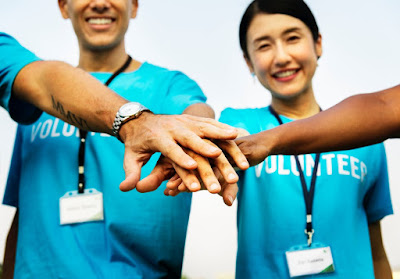Volunteering: Another Natural Wonder Drug
What if I told you there was something you could do that would make you healthier, happier, more attractive, more employable, and longer lived? And what if I said you could have a lot of fun and get a lot of fulfillment out of doing it?
Would you do it?
The activity I’m referring to is volunteering. There’s a growing body of research that indicates volunteering is beneficial in a ton of ways. Here are a few.
Let’s start with the health benefits. Obviously, if you volunteer, say, for your local conservation department (hint, hint) and you spend your free time maintaining parks and trails and cutting brush and planting trees, there’s going to be some physical exertion involved. And we all know exercise is good for our health.
But this goes far beyond that. According to an article from the Mayo Clinic, volunteering decreases the risk of depression, especially in older adults. Which makes sense if you think about it. The social interaction with individuals coming together for a common cause is a key feature in volunteering as well as a great prescription for combating depression.
A study from Johns Hopkins University used magnetic resonance imaging (MRI) to discover that volunteering delayed or even reversed declining brain function in older adults. Other studies suggest volunteering can reduce stress and even chronic pain.
A host of long-term studies point to volunteering as a life-extending wonder drug. A Wisconsin study that followed more than 10,000 individuals from their high school graduation in 1957 to the present found those that volunteered had lower mortality rates (1.6 percent) between 2004 and 2008 than those that didn’t (4.3 percent).
However, there was one caveat noted in this study. The life-extending benefits only seemed to apply to those who volunteered selflessly or simply for the sake of helping others because they felt it was the right thing to do. Study subjects who noted they volunteered for their own personal satisfaction had roughly the same mortality rate (4 percent) as did those who didn’t volunteer at all.
And guys, listen up, those selfless volunteers probably had easier times getting dates too. A study published in the British Journal of Psychology found that when selecting potential mates (their words, not mine), women place a high value on altruism and unselfish tendencies. Selflessness, say the researchers, apparently ranks right up there with the likes of physical attractiveness and intelligence.
While volunteering may actually increase the time you have on this earth, it also gives you the perception of having more time in your day-to-day life. A Harvard, Wharton, and Yale study found that giving of one’s time increases happiness, thus resulting in the desire to give back more as well as the feeling of having the time to do so. Since “not having enough time” is one of society’s biggest stressors, this positive feedback loop not only reduces stress but increases your perception of how much time you feel you have.
Which you may decide to use to search for a job. In a 10-year study that tracked 70,000 job seekers, the Corporation for National and Community Service found volunteers had a 27 percent better chance of finding a job. Other studies have documented volunteering’s benefits on building social and professional networks, learning and improving technical skills, and building confidence, character, and interpersonal skills. All of which are key traits for just about any potential employee.
Now before you go running off and signing on with the first organization that needs warm bodies, know that not all volunteer jobs are created equal. And yes, they are jobs. You’re giving your time and talent just like you do at work. Only your pay is moving a cause forward and not a check to cash. And you get to choose what to lend that time and talent to. So what do you enjoy doing? What are you so passionate about that you would work without pay to do?
If you answered “being outdoors” or “the environment,” there are a number of opportunities here at Des Moines County Conservation. For example, it takes a lot of help to put on events like the annual Youth Jamboree where 1,000 people spend the second Saturday in May exploring all there is to do outside at Big Hollow Recreation Area. In fact, we need some more people to help us organize this event now. Email outdooryouthjamboree@gmail.com to let us know you want to help.
We have a host of other events planned including a number of one-day field events where you can make a difference (and be outdoors) by fixing trails, removing invasive species, or restoring prairies. Join our volunteer list by emailing conservation@dmcounty.com and be sure to check out our events calendar at www.dmcconservation.com or by following Des Moines County Conservation on Facebook.
This piece originally appeared in my "Living Land" column in The Hawk Eye.
Like these posts? Subscribe here to get future Outdoor Executive Dad posts sent right to your inbox. No spam. I promise.
Would you do it?
The activity I’m referring to is volunteering. There’s a growing body of research that indicates volunteering is beneficial in a ton of ways. Here are a few.
Let’s start with the health benefits. Obviously, if you volunteer, say, for your local conservation department (hint, hint) and you spend your free time maintaining parks and trails and cutting brush and planting trees, there’s going to be some physical exertion involved. And we all know exercise is good for our health.
But this goes far beyond that. According to an article from the Mayo Clinic, volunteering decreases the risk of depression, especially in older adults. Which makes sense if you think about it. The social interaction with individuals coming together for a common cause is a key feature in volunteering as well as a great prescription for combating depression.
A study from Johns Hopkins University used magnetic resonance imaging (MRI) to discover that volunteering delayed or even reversed declining brain function in older adults. Other studies suggest volunteering can reduce stress and even chronic pain.
A host of long-term studies point to volunteering as a life-extending wonder drug. A Wisconsin study that followed more than 10,000 individuals from their high school graduation in 1957 to the present found those that volunteered had lower mortality rates (1.6 percent) between 2004 and 2008 than those that didn’t (4.3 percent).
However, there was one caveat noted in this study. The life-extending benefits only seemed to apply to those who volunteered selflessly or simply for the sake of helping others because they felt it was the right thing to do. Study subjects who noted they volunteered for their own personal satisfaction had roughly the same mortality rate (4 percent) as did those who didn’t volunteer at all.
And guys, listen up, those selfless volunteers probably had easier times getting dates too. A study published in the British Journal of Psychology found that when selecting potential mates (their words, not mine), women place a high value on altruism and unselfish tendencies. Selflessness, say the researchers, apparently ranks right up there with the likes of physical attractiveness and intelligence.
While volunteering may actually increase the time you have on this earth, it also gives you the perception of having more time in your day-to-day life. A Harvard, Wharton, and Yale study found that giving of one’s time increases happiness, thus resulting in the desire to give back more as well as the feeling of having the time to do so. Since “not having enough time” is one of society’s biggest stressors, this positive feedback loop not only reduces stress but increases your perception of how much time you feel you have.
Which you may decide to use to search for a job. In a 10-year study that tracked 70,000 job seekers, the Corporation for National and Community Service found volunteers had a 27 percent better chance of finding a job. Other studies have documented volunteering’s benefits on building social and professional networks, learning and improving technical skills, and building confidence, character, and interpersonal skills. All of which are key traits for just about any potential employee.
Now before you go running off and signing on with the first organization that needs warm bodies, know that not all volunteer jobs are created equal. And yes, they are jobs. You’re giving your time and talent just like you do at work. Only your pay is moving a cause forward and not a check to cash. And you get to choose what to lend that time and talent to. So what do you enjoy doing? What are you so passionate about that you would work without pay to do?
If you answered “being outdoors” or “the environment,” there are a number of opportunities here at Des Moines County Conservation. For example, it takes a lot of help to put on events like the annual Youth Jamboree where 1,000 people spend the second Saturday in May exploring all there is to do outside at Big Hollow Recreation Area. In fact, we need some more people to help us organize this event now. Email outdooryouthjamboree@gmail.com to let us know you want to help.
We have a host of other events planned including a number of one-day field events where you can make a difference (and be outdoors) by fixing trails, removing invasive species, or restoring prairies. Join our volunteer list by emailing conservation@dmcounty.com and be sure to check out our events calendar at www.dmcconservation.com or by following Des Moines County Conservation on Facebook.
Like these posts? Subscribe here to get future Outdoor Executive Dad posts sent right to your inbox. No spam. I promise.



Comments
Post a Comment